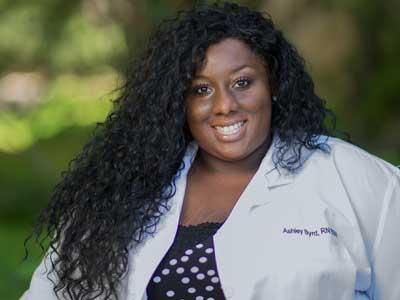Growing up in the small East Texas town of Jasper, Ashley Byrd was taught the value of education by her parents. Her maternal grandmother was illiterate and had to end her formal education in eighth grade.
“My mom wanted much more for me. She knew how tough it had been for her mother,” Byrd said.
This same beloved grandmother also would unintentionally play a role in the career path her granddaughter would choose.
“As a child, I saw my grandmother dying of cancer. I observed the hospice nurse who came and cared for her. That experience made me want to become a nurse.”
At age 14, Byrd started volunteering at a hospital in Jasper. That experience confirmed her decision to be a nurse. She went on to earn her bachelor of science in nursing degree from Lamar University in Beaumont.
While working on her undergraduate degree, Byrd noticed that the psychiatric population in the community was underserved. She said her religious values helped her decide that she needed to work with this underserved population.
“After graduating, I worked with adolescent, adult and geriatric patients in the behavioral unit of a hospital in Beaumont. I was promoted to charge nurse and did that for three years,” Byrd said. “After working as a registered nurse, I decided I wanted to continue my education and become a nurse practitioner specializing in psychiatric and mental health care.”
That desire led her to the School of Nursing at the UT Health Science Center San Antonio. The School of Nursing offers a master of science in nursing degree with a major in psychiatric mental health nurse practitioner.
“I noticed the need for nurse practitioners while I was working as a registered nurse. I enjoy being a lifelong learner, and I wanted to help serve the community better,” she said.
As part of her graduate degree program, Byrd was introduced to evidence-based quality improvement through her research course. In further pursuit of research activities, she enrolled in an “Applications of Research” elective course and directly engaged in research in the university’s Academic Center for Evidence-Based Practice (ACE).
Founded by Kathleen R. Stevens, Ed.D., RN, ANEF, FAAN, ACE was established as a Center of Excellence in 2000. ACE is dedicated to bridging research into practice with the ultimate goal of improving care, patient outcomes and patient safety and is devoted to building a workforce that will transform health care quality.
During the course, Byrd started working in ACE as a research assistant with Frank Puga, Ph.D., assistant research professor in ACE within the Department of Health Restoration and Care Systems Management in the School of Nursing. Dr. Puga’s funded research, titled “A System Approach to Inform Interventions that Reduce the Negative Effects of Stress on Frontline Nurses,” is studying physiological manifestations (increased cortisol levels) and psychological manifestations (burnout) of stress experienced by nurses in order to recommend system-level changes to help reduce this stress.
“We are looking at reducing nurses’ stress, which is something I saw firsthand in the mental health field. I think it is an epidemic in the nursing field. Because of stress, you see turnover in the field. We want to see what we can do to change this,” Byrd said.
Currently in the startup stages, Byrd is learning how to run a research project. The next stage will be implementation of the pilot study. “We will go into two hospitals and take salivary samples from nurses to measure their cortisol level, which is a physiological marker of stress. The next phase of the study will be conducting interviews with the nurses.
“Once the pilot study is completed, we will compile the information and make modifications before the research study is implemented in many more hospitals,” she said. “Our first goal is to describe the relationship of psychological stress and the work environment. Our second goal is to identify ways to mediate this stress.”
Under the guidance of Drs. Puga and Stevens, Byrd said she is learning to be a better student and to become a better nurse.
“They are helping me to be the type of nurse that I always wanted to be. I want to be the type of nurse who constantly evaluates what I am doing and how I am doing it. Is there evidence-based research that backs what I am doing?
“By understanding how to do research and how to apply it in the field, I will be able to better care for my mentally ill patients. I can make a difference in their lives. I can make their lives better,” she added.

